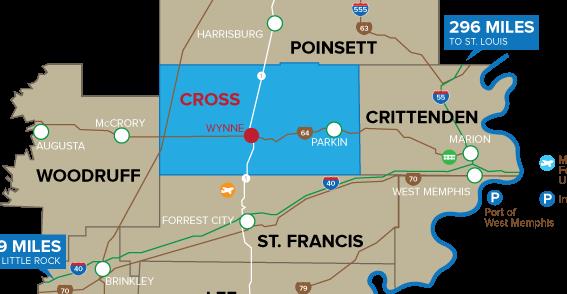New technology, industrial park certified in Wynne
by September 11, 2017 11:58 am 1,053 views

It’s taken economic developers more than three years, but a 500-acre swath in southern Wynne near Highway 1 has been certified as a technology/industrial park.
No announcements are imminent, but Cross County/Wynne Chamber of Commerce President Christopher Clifton told Talk Business & Politics his organization is in talks with multiple companies that have expressed an interest in locating in the park.
“It’s been a labor of love for me … we hope we will be able to make a major announcement in 2018, if the stars align,” he said.
Several industries – food, food processing, logistics, metal working, and electronic – have been targeted. The park will have the capacity to discharge 1.3 million gallons of wastewater, meaning it should appeal to food manufacturers, Clifton said. The park is 39 miles from Memphis, and is within a half-hour drive of an intermodal site in Marion. Wynne already has an industrial park, but it is at capacity.
Entergy, Woodruff Electric Cooperative, the Arkansas Economic Development Commission, and the Delta Regional Authority have partnered on the project.
In 2011, local voters approved a half-cent economic development sales tax hike. It generates about $61,000 per month. Voters opted to renew the tax last year through 2022. About $250,000 had to be spent to certify the site and another $1.8 million has been set aside to buy the property once a prospect or prospects commit to the site. It took officials about a year, but a first-option to buy from the property owners has been obtained.
Certification is a critical element in the process, Clifton said. A historical analysis of the land is conducted to ensure the soil isn’t contaminated. For instance, if a gas station was somewhere on the property 50 years ago, there might not be any evidence it existed, but an old tank with fuel or other toxins might still be in the ground.
Once the soil contamination study is complete, an archaeological survey is done. Clifton, who has been a part of nine other industrial park projects, said artifacts and other ancient remains need to be identified, studied, and removed before a building project can begin in most instances. Skipping this step can derail a major project once it gets underway, he said.
At least 29 soil borings were done to determine how compact the soil is and where the best places on the site to build are. How compact the soil is impacts how high the footings and foundations have to be to keep potential buildings out of the 100-year flood zone. The area is a few feet above the flood zone, but much of Northeastern Arkansas is flat, and high waters are unpredictable, he said.
Certification is a crucial step. It removes several hurdles for prospects and makes the site more desirable, said Clifton.
One of the objectives is to not just create jobs, but lure higher-paying jobs to the region. Jobs like that require higher education and training levels, and it will be a challenge, he said.
Wynne’s population has dropped 3.5% since 2010, and the city now has about 8,000 people. The median household income is $39,015, according to the U.S. Census Bureau. The individual per capita income is $18,630 and about 22.3% of the population lives at or below the poverty line.
When a major announcement is made, economic developers will likely go back to the voters and ask for a 10-year extension on the sales tax. It will take at least 10, possibly 15 years to fully develop the site, and it will take money to ensure its success, he said. Each year there are about 3,000 companies searching for locations, and there are at least 35,000 communities and economic development organizations attempting to lure them to a particular place.
Clifton said talks are underway to get the site certified by Union-Pacific Railroad. He expects the site to be approved before the end of the year and said it will be a valuable recruiting tool. There’s one resource in this part of the state that remains untapped, he said.
“I think our best-kept secret is our human capital. We have some of the best people in eastern Arkansas,” said Clifton.
